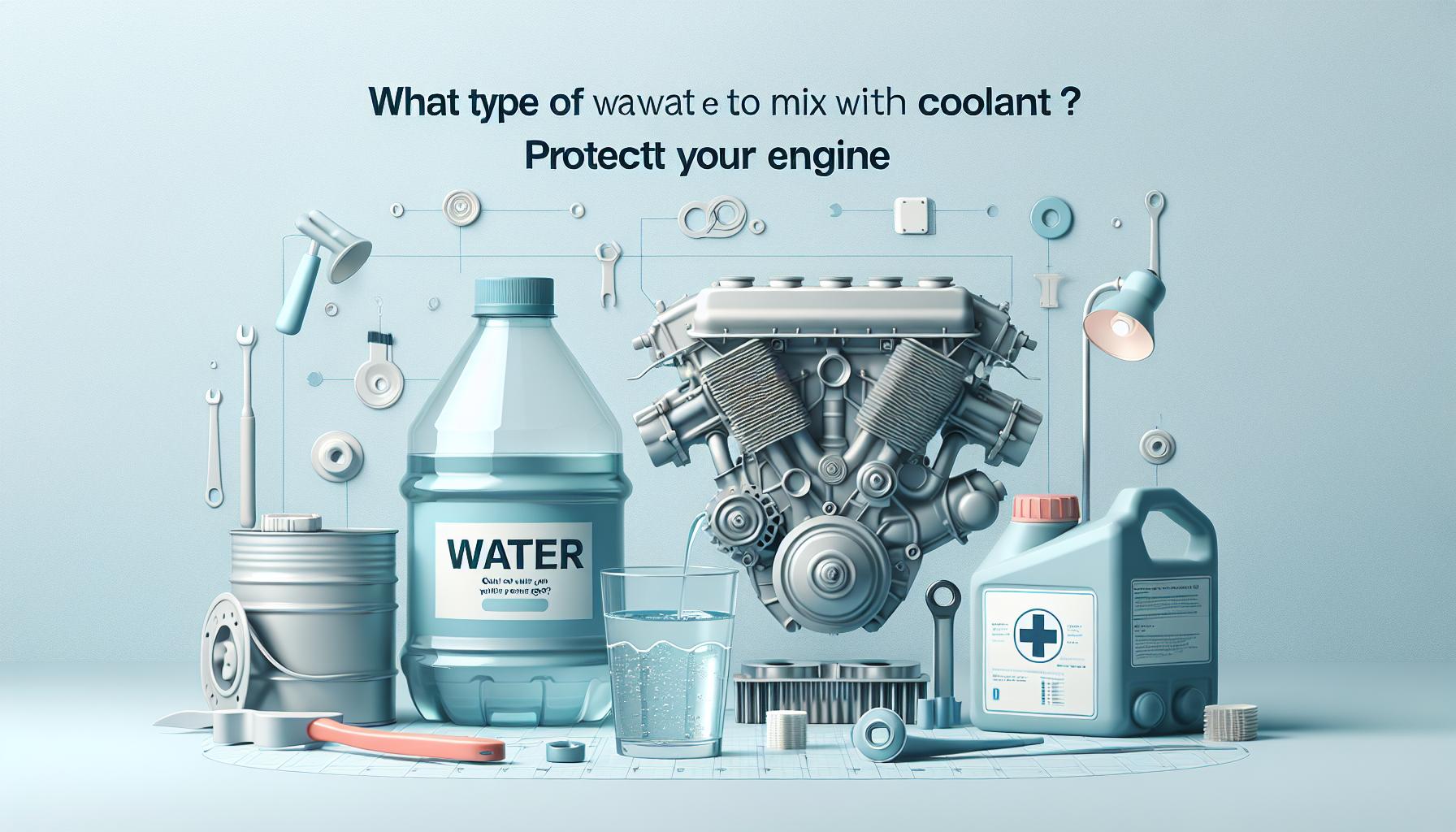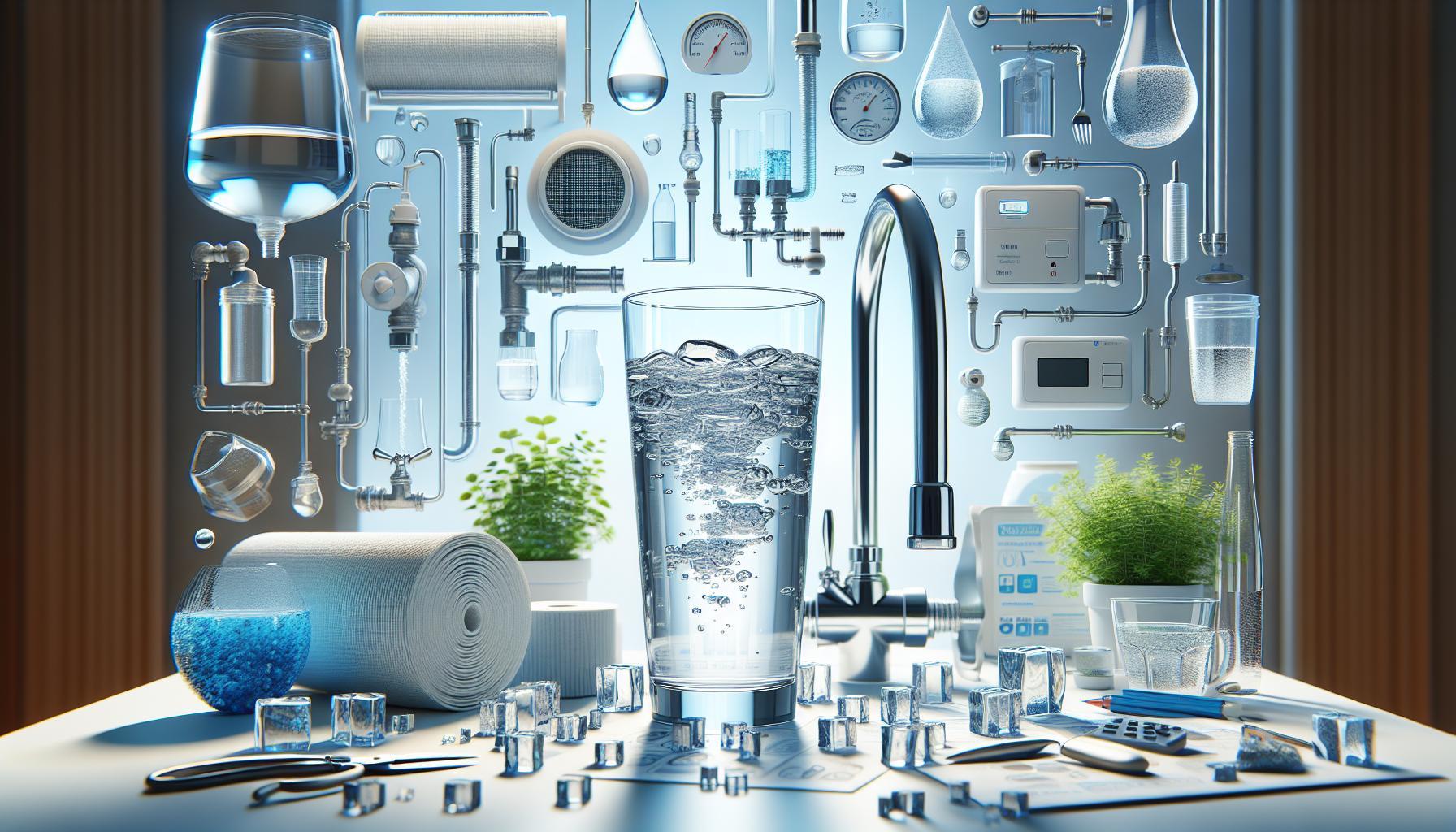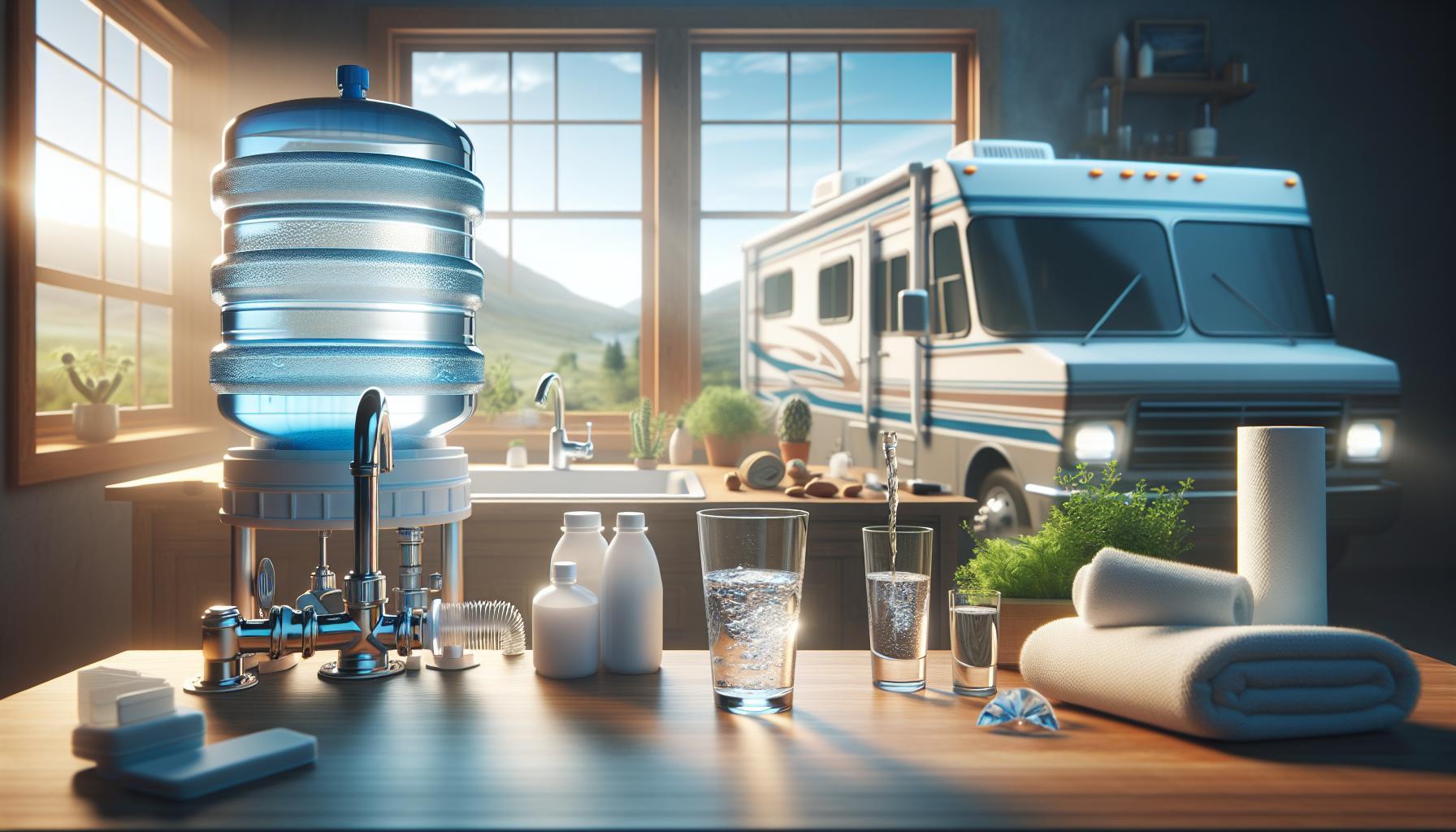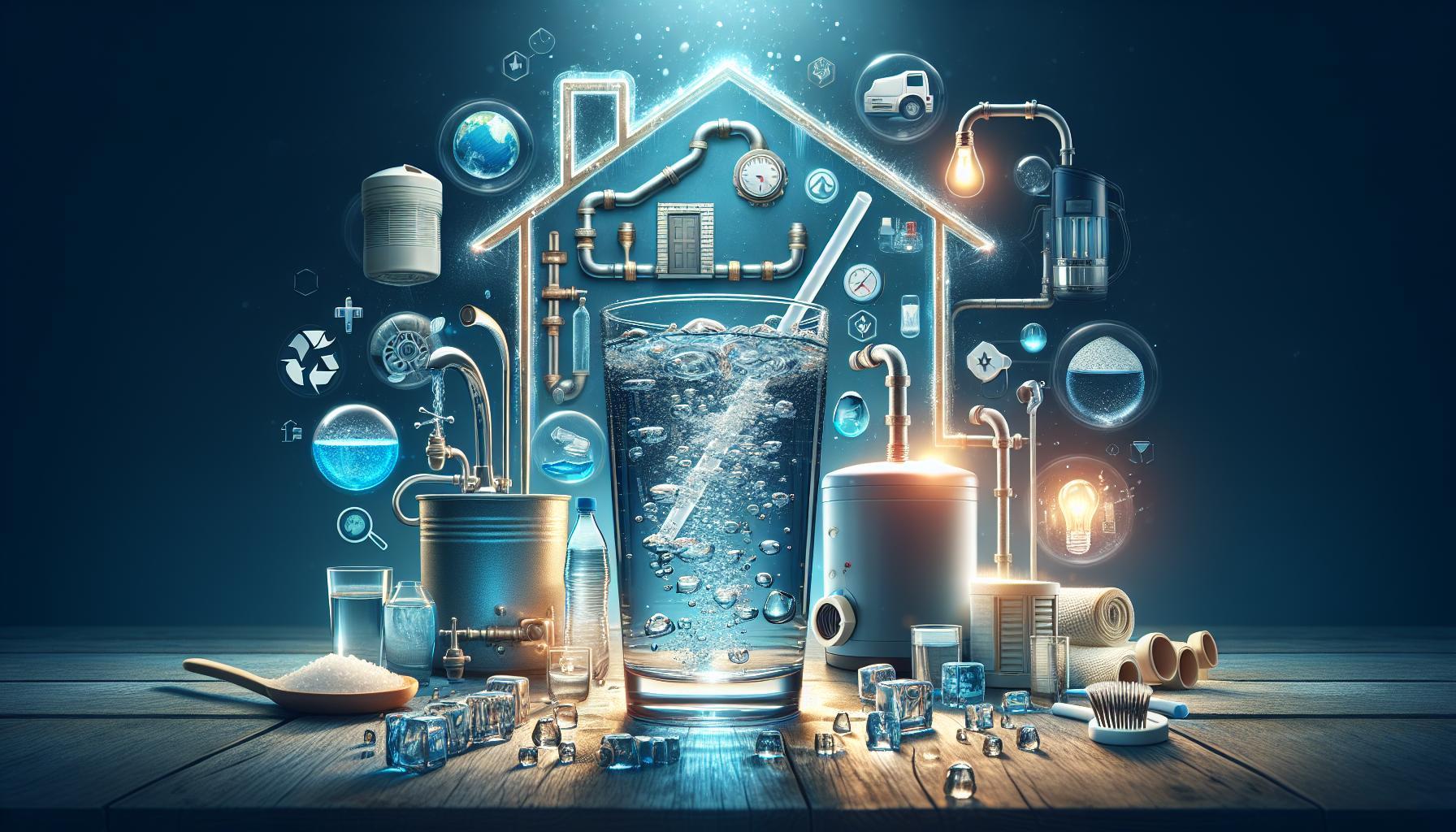Choosing the right water to mix with your coolant is crucial for optimal engine performance and longevity. Using distilled or deionized water can prevent mineral buildup and corrosion, ensuring your vehicle runs smoothly. This essential tip can save you costly repairs and keep your engine in top shape. Discover why the right water matters!
Understanding the Role of Water in Coolant Mixtures

Water serves as the lifeblood of coolant mixtures, wielding a significant influence over engine performance and longevity. While it may seem straightforward, the type of water used in a coolant mixture can greatly affect its efficiency in regulating engine temperature and preventing corrosion. Understanding the critical role that water plays not only helps in optimizing engine health but also guides car owners in making informed decisions when mixing coolant.
Types of Water: What to Choose?
When contemplating the ideal water for mixing with coolant, it’s essential to consider the following types:
- Distilled Water: The safest and most recommended option, distilled water is free from minerals and impurities that could cause scaling or corrosion within the cooling system. Using distilled water helps maintain the efficacy of the coolant, ensuring that it operates at optimal temperatures.
- Deionized Water: Similar to distilled water, deionized water undergoes a purification process to remove ions and contaminants. This type of water is also a good choice for mixing with coolant, as it minimizes the risk of mineral deposits.
- Tap Water: While readily available, tap water is generally not ideal for mixing with coolant. It often contains minerals such as calcium and magnesium, which can lead to scaling and corrosion over time. If you must use tap water, ensure it is low in minerals and impurities.
The Importance of pH and Mineral Content
The pH and mineral content of the water you choose can significantly impact the performance of your coolant mixture. Maintaining a neutral pH is crucial, as acidic or alkaline water can accelerate corrosion and degrade the coolant. Hard water, characterized by high mineral content, can lead to deposits that hinder heat transfer, resulting in potential overheating issues.
| Water Type | Corrosion Potential | Scaling Risk |
|---|---|---|
| Distilled Water | Low | Low |
| Deionized Water | Low | Low |
| Tap Water | Medium to High | Medium to High |
In summary, the careful selection of water for your coolant mixture is critical in preserving engine performance and longevity. By opting for distilled or deionized water, you can protect your engine from potential damage while ensuring your coolant performs its function effectively. Such simple yet impactful decisions embody the essence of protecting your engine—making each drive safer and more efficient.
Distilled vs. Tap Water: What’s Best for Your Engine?

Using the right type of water in your engine’s cooling system can significantly affect performance and longevity. While water might seem like a simple choice, the quality of the water you use is critical, especially when deciding between distilled and tap water. Distilled water is purified through boiling and condensation, removing impurities and minerals that could harm your engine. In contrast, tap water contains various minerals and additives that can lead to scale buildup and corrosion over time.
Why Choose Distilled Water?
When considering what type of water to mix with coolant, distilled water is often the best option due to its purity. Here are some reasons why:
- Minimized Corrosion: Distilled water lacks the minerals that can lead to corrosion within engine components. By integrating it with your coolant, you provide a product that works harmoniously with your engine’s materials.
- Better Heat Transfer: The absence of minerals in distilled water allows for better thermal conductivity, enhancing the cooling efficiency and keeping engine temperatures stable under load.
- Prevents Scale Buildup: Using distilled water helps avoid the accumulation of scale that can form from minerals found in tap water, which may block cooling passages and reduce overall cooling effectiveness.
Considerations for Tap Water
On the other hand, while it may be convenient to use tap water, it poses risks for your engine system. Many municipal water supplies add chlorine, fluoride, and other chemicals, which can lead to several problems:
- Potential for Scaling: The dissolved minerals such as calcium and magnesium in tap water can form deposits over time, leading to clogs and inefficient heat transfer.
- Corrosion Risks: Contaminants and chemicals in tap water, like chlorine, can be corrosive to metal engine components, degrading their lifespan.
- Inconsistent Quality: The quality of tap water can vary greatly depending on your location, making it a less reliable choice overall.
Conclusion
When deciding on what type of water to mix with coolant to protect your engine, using distilled water is generally the superior choice. Not only does it enhance cooling efficiency and reduce corrosion, but it also prolongs the life of your cooling system. For optimal engine performance and maintenance, specifically aiming to safeguard against common issues related to water quality, distilled water stands out as the smarter investment.
The Impact of Hard Water on Coolant Performance
When it comes to engine maintenance, the choice of water used in coolant mixtures is pivotal, with hard water often being a silent saboteur. In many regions, particularly those with high mineral content in their water supply, the use of hard water can significantly impact the performance of coolants. The consequences can range from diminished heat transfer efficiency to the formation of scale and deposits that wear down engine components over time.
Understanding Hard Water and Its Composition
Hard water is rich in dissolved minerals such as calcium and magnesium. While these minerals are beneficial in certain contexts, when mixed with coolant, they can lead to undesirable outcomes. Some key effects of hard water on coolant performance include:
- Scale Formation: As hard water evaporates within the cooling system, mineral deposits accumulate, forming scale. This buildup can insulate heat exchange surfaces, reducing the efficiency of the cooling system.
- Corrosion Risks: The presence of hard water can increase the risk of corrosion. The minerals react with the metal surfaces in the engine, especially in the presence of antifreeze, leading to pitting and rust.
- Reduced Heat Transfer: Any scaling can substantially decrease the area available for heat transfer, causing the engine to run hotter than intended, which can lead to overheating and potential engine damage.
Practical Solutions to Combat Hard Water Effects
To ensure that your coolant performs optimally and protects your engine, consider the following strategies:
- Use Distilled or Deionized Water: Mixing coolant with distilled or deionized water is one of the best practices to avoid the complications associated with hard water. These water types have had minerals removed, ensuring they do not contribute to scaling or corrosion.
- Regular Coolant Changes: Frequent checks and changes of your coolant can help mitigate the effects of any deposits that may form over time, especially if you’ve used hard water in the past.
- Install a Water Softener: If hard water is prevalent in your area, consider installing a water softener for filling your cooling system. This modification can significantly reduce mineral content, ensuring your coolant maintains its protective properties.
By being informed about the impacts of hard water on coolant performance, as well as taking preventive measures, you can protect your engine more effectively. Keep in mind that when considering what type of water to mix with coolant, opting for soft or treated water will go a long way in ensuring your vehicle runs smoothly and efficiently.
How to Properly Mix Water and Coolant for Maximum Protection

Mixing water with coolant is a crucial step in maintaining your vehicle’s engine. The right mixture can significantly enhance your engine’s performance, lifespan, and overall efficiency. However, not all water is created equal, and using the wrong type can lead to corrosion, overheating, or damage. Here’s how to achieve an optimal blend for maximum protection.
Understanding the Ideal Water-Coolant Ratio
Most vehicle manufacturers recommend a blend of 50% coolant to 50% water for optimum protection and cooling efficiency. This standard mixture combines adequate freezing protection with effective boiling point elevation, providing a robust shield against temperature extremes. Here are some common mixes based on specific needs:
- Standard Climate: 50/50 mixture is ideal for most climates.
- Cold Climates: Increase coolant to 70% for enhanced freeze protection.
- Hot Climates: Adjust to a 60/40 ratio in favor of coolant to prevent overheating.
Choosing the Right Type of Water
When it comes to water, the choice can make all the difference. Here are the top options:
| Type of Water | Pros | Cons |
|---|---|---|
| Distilled Water | Pure with no minerals; prevents scaling and corrosion. | None significant. |
| Tap Water | Convenient and accessible. | Can contain minerals that lead to deposits and corrosion. |
| Deionized Water | Removes ions and impurities effectively. | Less commonly available; may be costly. |
For maximum protection, it’s best to stick with distilled water when mixing with any type of coolant. This eliminates the risk of mineral buildup, which can hinder your cooling system’s performance over time.
Steps to Mix Water and Coolant Correctly
Follow these practical steps to achieve the best results:
- Gather Your Materials: Collect the necessary coolant type, distilled water, and a clean container.
- Measure Accurately: Use a measuring cup or container to ensure you maintain the desired water-to-coolant ratio.
- Mix Thoroughly: Pour the water into the container first, followed by the coolant. Stir well to ensure an even mixture.
- Fill the Cooling System: Carefully add the mixture into your vehicle’s cooling system as per the manufacturer’s guidelines.
- Check Levels Regularly: Periodically check and top off your mixture as needed, as coolant can degrade over time.
By following these guidelines and adequately mixing your water and coolant, you can protect your engine from overheating, freezing, and internal corrosion, ensuring that your vehicle runs smoothly for years to come. Proper preparation now leads to enhanced performance later, keeping your engine safe under pressure.
Seasonal Considerations: Adjusting Your Coolant Mixture
Adjusting the coolant mixture in your vehicle is not just a matter of convenience; it’s a critical part of maintaining engine health, especially as seasons change. During summer, temperatures can soar, increasing the risk of overheating, while winter brings frigid conditions that can lead to freezing. Understanding how to modify your coolant mixture in response to these shifts can safeguard your engine, ensuring optimal performance and durability.
Understanding Seasonal Impacts
Different seasons present unique challenges for your vehicle’s cooling system. As the temperature fluctuates, so too should your coolant composition. Here are some factors to consider:
- Summer Conditions: High temperatures can cause the coolant to lose its effectiveness. A mixture that leans towards a higher concentration of coolant can provide extra protection against overheating.
- Winter Considerations: In stark contrast, a winter mixture should include a higher ratio of water to prevent the coolant from freezing and ensure that it circulates properly during cold starts.
- Transition Seasons: During spring and fall, it’s crucial to monitor local climate variations. It might be a time to reassess and potentially adjust your coolant mixture accordingly.
Recommended Coolant Ratios
Getting the right balance in your coolant mixture ensures that it will perform effectively throughout the year. Here is a simple guide to help you tailor your mixture based on seasonal requirements:
| Season | Recommended Coolant Ratio | Water Type |
|---|---|---|
| Summer | 60% Coolant / 40% Water | Distilled Water |
| Winter | 50% Coolant / 50% Water | Distilled or Deionized Water |
| Spring/Fall | 50% Coolant / 50% Water | Distilled Water |
Making adjustments to your coolant mixture based on seasonal changes not only helps in preventing engine damage but also optimizes performance. As temperatures rise or fall, keep an eye on your car’s coolant levels and consider routine checks and adjustments as part of your regular maintenance schedule.
Common Mistakes to Avoid When Mixing Water with Coolant
When it comes to maintaining your vehicle’s cooling system, the ratio of water to coolant is critical for engine longevity and performance. However, many vehicle owners unknowingly make mistakes in their mixing process, which can lead to severe consequences such as overheating or corrosion. Understanding the common pitfalls can help you ensure that you’re protecting your engine effectively and maximizing the life of your vehicle.
Using Tap Water
One of the most prevalent mistakes is using tap water to mix with coolant. While it may seem convenient, tap water often contains minerals and impurities that can cause scale buildup and corrosion in your engine. Hard water, in particular, has high levels of calcium and magnesium, which can precipitate out and form deposits over time. Instead, always opt for distilled or deionized water, as these options are free of such contaminants.
Inaccurate Mixing Ratios
Another critical error involves not adhering to the recommended mixing ratios. Coolants generally come in a concentrated form and require dilution with water. Failing to follow the manufacturer’s guidelines can lead to a mixture that is too strong or too weak. An overly concentrated coolant can thicken and impede circulation, while a diluted mixture reduces the coolant’s ability to lower the freezing point and raise the boiling point effectively. Always check your vehicle’s manual to determine the appropriate ratio, typically around 50/50 for most models.
Ignoring Seasonal Changes
Many drivers forget that the climate in which they operate their vehicle has a significant impact on the type of water-coolant mixture needed. For example, colder climates require mixing more coolant with water to lower the freezing point, while in hot climates, a more balanced mix helps prevent overheating. Failing to adjust your mixture according to seasonal changes can compromise your engine’s efficiency.
Key Tips to Avoid Mixing Mistakes
- Use distilled or deionized water only.
- Adhere strictly to the manufacturer’s recommended mixing ratios.
- Adjust your mixture based on seasonal climate needs.
- Periodically check the concentration of your coolant with a hydrometer.
By avoiding these common mistakes in mixing water with coolant, you significantly improve your engine’s performance and extend its life. Remember, a little diligence goes a long way in vehicle maintenance, ensuring that you protect your engine effectively at every turn.
The Benefits of Using Additives in Your Coolant Mix
In the world of automotive maintenance, the use of coolant is essential for protecting your engine from overheating and corrosion. However, not all coolants are created equal, and the mixing of additives into your coolant blend can significantly enhance its performance and longevity. Understanding how to leverage these additives can be a game-changer in extending the life of your engine and optimizing its efficiency.
Enhanced Engine Protection
When it comes to safeguarding your engine, additives can provide crucial benefits. They act as a barrier against harmful elements such as rust, scale, and corrosion. With the right mix, these additives form protective films on various engine components, drastically reducing the chances of damage due to high temperatures or contamination. The use of additives can also improve heat transfer, ensuring that your vehicle remains cool under pressure.
Improved Performance and Longevity
Additives enhance overall coolant performance, which translates to better engine efficiency. For example, using a coolant with specific anti-foaming agents helps maintain optimal heat transfer by preventing the formation of air bubbles that can reduce the fluid’s effectiveness. In addition, coolant stabilizers can increase the lifespan of your engine components by preventing chemical breakdown. Here’s a quick comparison of some common additives and their benefits:
| Additive Type | Benefit |
|---|---|
| Corrosion Inhibitors | Prevent rust and corrosion on metal components. |
| Anti-Foaming Agents | Improve heat transfer by reducing air bubbles. |
| pH Stabilizers | Maintain balanced acidity levels to prevent corrosion. |
| Water Pumps and Seal Lubricants | Reduce wear on pumps and seals, enhancing their lifespan. |
Cost-Efficiency in the Long Run
Investing in the right additives can also lead to significant cost savings over time. By preventing engine problems before they occur, you can avoid costly repairs and replacement parts. For instance, a minor investment in a quality coolant mix with effective additives could save you from a potential engine failure down the line. Plus, the enhanced efficiency can lead to better fuel economy, providing added financial benefits.
With the myriad advantages that come from using additives in your coolant mix, understanding how to combine them properly transforms your engine maintenance routine. The question of what type of water to mix with coolant is just the beginning—it’s the choice of additives that can truly safeguard your engine and improve its performance over time.
Maintaining Your Engine: Regular Checks and Water Quality
Maintaining the engine of your vehicle goes beyond routine oil changes and filter replacements; it involves careful attention to the fluids you use and regular checks that keep your engine running smoothly. One critical aspect of engine health is the quality of the water used in your coolant mixture. Understanding what type of water to mix with coolant is vital for protecting your engine against overheating and corrosion, ensuring longevity and peak performance.
Quality of Water for Coolant
When mixing coolant, using the right type of water is essential. Distilled water is the best option because it is free from minerals and impurities that can lead to scale buildup and corrosion over time. Here are key points to consider when selecting water for your coolant mix:
- Distilled Water: This is the gold standard for mixing with coolant due to its purity, reducing the risk of deposits.
- Tap Water: While convenient, tap water often contains minerals like calcium and magnesium, which can lead to scaling inside the engine.
- Rain Water: While generally softer than tap water, rainwater can contain pollutants that may harm engine components.
Regular Maintenance Checks
In addition to using the right water, conducting regular checks on your coolant system is crucial for engine protection. Make a habit of inspecting the coolant levels and quality to prevent engine overheating. Here are some practical maintenance tips:
- Check Coolant Levels: Make sure to regularly check the coolant reservoir, especially before long trips.
- Examine Coolant Condition: Look for discoloration or particles in the coolant, which can indicate contamination.
- Inspect Hoses and Connections: Look for signs of wear, leaks, or cracks in coolant hoses to prevent failures.
Taking proactive steps in maintaining water quality and conducting regular engine checks not only enhances performance but also safeguards your vehicle against costly repairs. Emphasizing these engine maintenance tips and understanding what type of water to mix with coolant can significantly extend the life and efficiency of your engine, making these practices essential for every vehicle owner.
Frequently Asked Questions
What Type of Water to Mix with Coolant? Protect Your Engine?
The best type of water to mix with coolant is distilled water. It is free from minerals and impurities that can cause engine damage over time.
Using distilled water prevents the buildup of scale and deposits in your cooling system, which can impede its functionality. Tap water contains minerals, such as calcium and magnesium, which may lead to corrosion and blockages. By choosing distilled water, you ensure your engine remains protected and operates efficiently.
For more details on coolant types and mixtures, check out our article on different types of coolant.
Can I Use Tap Water with Coolant?
While you can use tap water with coolant, it is not recommended. The minerals in tap water can lead to corrosion and clogging in the cooling system.
Tap water often contains minerals and impurities that can react with the chemicals in your coolant. This reaction not only decreases efficiency but can also shorten the lifespan of your engine components. To ensure optimal performance, always opt for distilled water when mixing with your coolant.
Why Does the Type of Water Matter for Coolant?
The type of water you use for coolant is crucial because it affects your engine’s cooling efficiency and longevity. Using the wrong water can lead to corrosion and scale buildup.
Mineral-rich water can cause unwanted reactions within your cooling system, potentially leading to costly repairs. To keep your engine running smoothly, it’s vital to choose the right type of water, primarily distilled water, to prevent any damaging effects.
How to Mix Water with Coolant for Optimal Protection?
To mix water with coolant for optimal protection, use a 50/50 ratio of distilled water and coolant. This balance provides excellent protection against freezing and overheating.
Mixing equal parts ensures that the benefits of both the coolant and the water are maximized. If you live in an area with extreme temperatures, you might adjust this ratio slightly, but the 50/50 mix is effective for most conditions. Always consult your vehicle’s manual for specific recommendations regarding your engine’s needs.
What Happens If I Use Hard Water in My Coolant?
Using hard water in your coolant can lead to mineral buildup and corrosion in your engine, which ultimately affects performance and can result in failures.
Hard water contains high levels of calcium and magnesium, making it unsuitable for cooling systems. Over time, the minerals deposit in the radiator and engine parts, leading to reduced efficiency and costly repairs. To avoid these issues, stick to distilled water when mixing coolant.
Can Mixing Different Types of Coolant Be Harmful?
Yes, mixing different types of coolant can be harmful as it may lead to chemical reactions that reduce effectiveness and cause engine damage.
Different coolant formulations contain varying additives that can react negatively when combined. Such reactions can result in decreased corrosion protection and increased sludge formation. It’s essential to check compatibility and, when in doubt, flush the system before adding a different type of coolant.
How Often Should I Change the Coolant and Water Mix?
You should change the coolant and water mix every 2 to 3 years or according to your vehicle manufacturer’s recommendations to maintain engine health.
Over time, coolant can break down and lose its effectiveness, making regular monitoring essential. Factors like driving conditions and engine type can play a role in determining how often you should change it. Always refer to your vehicle’s manual for specific guidelines to ensure optimal protection.
In Conclusion
In conclusion, choosing the right type of water to mix with your coolant is crucial for protecting your engine and ensuring its longevity. Distilled water is often the best choice as it is free from minerals and impurities that can lead to scale buildup and corrosion. If you opt for tap water, ensure it is soft and low in minerals to avoid potential issues. Remember to always follow the manufacturer’s recommendations for the ideal coolant and water mixture for your vehicle. With this knowledge, you can confidently maintain your engine’s performance and extend its life. For more tips on engine care and maintenance, continue exploring our resources and engage with our community—your engine will thank you!






